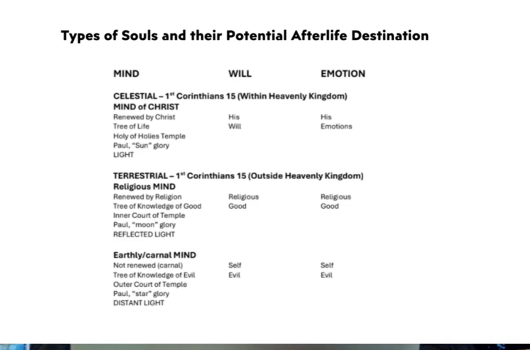@St. SteVen,
@Aunty Jane
A BIBLICAL VIEW OF THE STATE OF THE DEAD (CONDITIONAL IMMORTALITY)
This understanding, often termed conditional immortality or "soul sleep," posits that humans lack an inherently immortal soul that consciously survives bodily death. Instead, death is an unconscious state, likened to sleep, persisting until the resurrection.
HUMAN NATURE AT CREATION
Genesis 2:7 states, "And the LORD God formed man of the dust of the ground, and breathed into his nostrils the breath of life; and man became a living soul (Hebrew: nephesh chayyah)."
Man didn't receive a pre-existing immortal soul. The combination of the "dust" (physical body) and the "breath of life" (God's life principle) resulted in a "living soul" or "living being"—the whole person. The Hebrew term nephesh (soul) is used broadly, often referring to the person, life, or self, and does not inherently imply immortality.
Immortality was contingent upon obedience and access to the Tree of Life (Genesis 2:9). After sin, humanity was barred from it "lest he...take also of the tree of life, and eat, and live forever" (Genesis 3:22). This implies they did not possess inherent immortality. Scripture states that God "alone has immortality" (1 Timothy 6:16). Humans receive immortality as a gift from God through Christ (Romans 2:7; 1 Corinthians 15:51-54).
THE NATURE OF DEATH
Death involves the cessation of life and consciousness.
Ecclesiastes 9:5-6, 10 is a key text: "For the living know that they will die; But the dead know nothing... Also their love, their hatred, and their envy have now perished; Nevermore will they have a share In anything done under the sun... For there is no work or device or knowledge or wisdom in the grave (Sheol) where you are going." This indicates a complete lack of consciousness.
Psalm 146:4 adds, "His breath (spirit, ruach) goeth forth, he returneth to his earth; in that very day his thoughts perish." The "spirit" (ruach) is understood as the "breath of life" from God, the vital spark, not a conscious entity. Upon death, this returns to God (Ecclesiastes 12:7), while the body returns to dust (Genesis 3:19).
Other texts like Psalm 6:5, Psalm 115:17, Isaiah 38:18-19, and Job 14:10-12, 21 confirm this state of silence, inactivity, and unawareness in death.
The Bible frequently describes death as "sleep." This metaphor implies unconsciousness and a future awakening (resurrection).
Jesus said of Lazarus, "Our friend Lazarus sleeps...Lazarus is dead" (John 11:11-14).
Paul refers to deceased believers as "those who sleep in Jesus" (1 Thessalonians 4:13-17), who will be awakened at Christ's return. Daniel 12:2, Acts 7:60 (Stephen "fell asleep"), and Paul's writings in 1 Corinthians 15 also use this "sleep" metaphor.
THE RESURRECTION – THE HOPE OF BELIEVERS
If the soul is already consciously in heaven or hell, the strong biblical emphasis on a future bodily resurrection (1 Corinthians 15) becomes theologically problematic or less significant.
Paul argues in 1 Corinthians 15:16-18, "For if the dead do not rise, then Christ is not risen... Then also those who have fallen asleep in Christ have perished." His argument hinges on the idea that without resurrection, the dead in Christ have simply ceased to exist or remain unredeemed.
Job's hope was in a future, bodily encounter: "in my flesh I shall see God" (Job 19:25-27).
The timing of reward and punishment is tied to the resurrection.
John 5:28-29 points to a future "hour...in which all who are in the graves will hear His voice and come forth—those who have done good, to the resurrection of life, and those who have done evil, to the resurrection of condemnation."
Revelation 20:4-6 describes the "first resurrection" of the righteous at Christ's second coming. The "rest of the dead" (the wicked) do not live again until after a symbolic thousand years.
Reward is given at the Second Coming (Matthew 16:27; 2 Timothy 4:8).
ADDRESSING COMMONLY MISUNDERSTOOD PASSAGES
The Rich Man and Lazarus (Luke 16:19-31):
This is widely understood as a parable, not a literal depiction of the afterlife. Jesus uses elements of existing Jewish folklore (e.g., "Abraham's bosom") to teach moral lessons about wealth, compassion, the irrevocability of choices, and the authority of Scripture. If taken literally, it would contradict clearer scriptural teachings on the unconsciousness of the dead. Parables often contain non-literal elements to convey spiritual truth (e.g., talking trees in Judges 9:8-15).
The Thief on the Cross (Luke 23:43):
"Assuredly, I say to you, today you will be with Me in Paradise."
The original Greek manuscripts had no punctuation. The placement of the comma is interpretive. The statement can be understood as: "Assuredly, I say to you today, you will be with Me in Paradise." This emphasizes the certainty of the promise made on that day, not its immediate fulfillment on that day. Jesus Himself did not go to Paradise that day; He rested in the tomb (Matthew 12:40) and told Mary Magdalene on Sunday morning, "I have not yet ascended to My Father" (John 20:17). "Paradise" here is understood as the Paradise restored, which believers enter after the resurrection.
"Absent from the body... present with the Lord" (2 Corinthians 5:8):
Paul expresses a desire: "We are confident, yes, well pleased rather to be absent from the body and to be present with the Lord." The context (2 Corinthians 5:1-10) is Paul's longing for his resurrected, glorified body, contrasting the earthly "tent" with the "building from God...eternal in the heavens." The transition from being "absent from the body" to being "present with the Lord" occurs at the resurrection. For the dead, the next conscious moment after death is the resurrection; there is no consciousness of the intervening time.
Souls Under the Altar (Revelation 6:9-11):
"I saw under the altar the souls of those who had been slain..."
The book of Revelation is highly symbolic. Blood, representing life, was poured at the base of the altar of sacrifice (Leviticus 4:7). This imagery personifies the martyrs' sacrifice crying out for justice, similar to how Abel's blood cried out from the ground (Genesis 4:10). It's symbolic language, not a literal description of disembodied souls.
Saul and the "Witch" of Endor (1 Samuel 28):
This account describes Saul consulting a medium who seemingly conjures up Samuel. This is interpreted by many as a demonic deception, not the actual spirit of Samuel. God had refused to answer Saul (1 Samuel 28:6), and necromancy is strictly forbidden (Deuteronomy 18:10-12). The apparition gave a message consistent with what Samuel had already told Saul, which a deceiving spirit could mimic. The text states "Saul perceived that it was Samuel," indicating his subjective perception.
THEOLOGICAL IMPLICATIONS
This view upholds God's justice and character. Eternal conscious torment for sins committed in a finite lifetime is seen by many as incompatible with God's love and justice. This view posits that the wicked are ultimately annihilated (the "second death," Revelation 20:14-15; Malachi 4:1, 3), ceasing to exist.
It guards against spiritualism. If the dead are unconscious ("know nothing"), then supposed communication with departed spirits must be deceptive, often attributed to demonic impersonations.
It elevates the Second Coming and Resurrection. These become the climactic events when believers receive their reward and immortality.
It provides comfort. The bereaved can find comfort knowing their loved ones are at peace, unconscious, not suffering or observing earthly events, awaiting the joyous reunion at the resurrection.
It is consistent with God's original plan, where immortality is a gift, not an inherent human attribute, received through Christ.
THE FINAL STATE
The Righteous: After the resurrection at Christ's Second Coming, they will live eternally with God in a new heaven and a new earth (Revelation 21-22).
The Wicked: After the resurrection following the millennium (Revelation 20:5, 11-15), they face final judgment and experience the "second death," which is complete annihilation (Malachi 4:1; Revelation 20:9, 14-15).
HISTORICAL CONSIDERATIONS
The doctrine of the inherent immortality of the soul is seen by many scholars as an intrusion of Greek philosophy (particularly Platonism) into early Christian thought, rather than a concept derived purely from Hebrew scriptures. "Soul sleep" or conditionalism was a notable minority view throughout church history, experiencing a resurgence during and after the Reformation.
CONCLUSION
The conditional immortality understanding of the state of the dead is rooted in a holistic interpretation of Scripture. It emphasizes the created nature of humanity, the meaning of death as an unconscious sleep, and the centrality of the resurrection as the believer's hope. This view is considered internally consistent with the broader biblical narrative and upholds the justice and love of God, maintaining that eternal life is His gift through Jesus Christ, fully realized at the resurrection.




